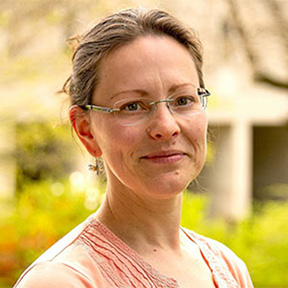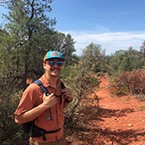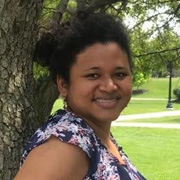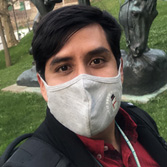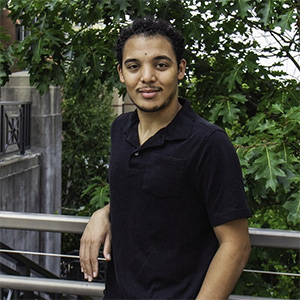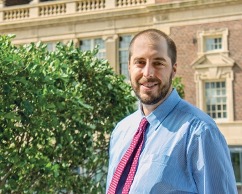Division of Environmental Science
Student Success Stories
2022
Jenny Frank
 Jenny Frank completed three degrees at SUNY ESF. Jenny cites the holistic perspective
to sustainable and renewable energy as her initial reason for choosing to study here.
Following completion of her undergraduate degree, Jenny was able to easily secure
jobs in industry, including a position at a solar energy company and an anaerobic
digester manufacturer. She returned to SUNY ESF to pursue graduate work in the Sustainable
Energy program because she felt there was so much more to learn. While completing
her graduate degrees, Jenny’s focus was on the technoeconomic analysis of renewable
energy pathways to quantity viability. Below are links to publications highlighting
this work.
Jenny Frank completed three degrees at SUNY ESF. Jenny cites the holistic perspective
to sustainable and renewable energy as her initial reason for choosing to study here.
Following completion of her undergraduate degree, Jenny was able to easily secure
jobs in industry, including a position at a solar energy company and an anaerobic
digester manufacturer. She returned to SUNY ESF to pursue graduate work in the Sustainable
Energy program because she felt there was so much more to learn. While completing
her graduate degrees, Jenny’s focus was on the technoeconomic analysis of renewable
energy pathways to quantity viability. Below are links to publications highlighting
this work.
- Quantifying the comparative value of carbon abatement scenarios over different investment timing scenarios
- The financial trade-off between the production of biochar and biofuel via pyrolysis under uncertainty
- Integrated Stochastic Life Cycle Assessment and Techno-Economic Analysis for Shrub Willow Production in the Northeastern United States
- Economic feasibility of forest biomass feedstock supply chains: clean and dirty chips for bioenergy applications
“SUNY ESF has provided me with the skills, knowledge, and support to help me obtain a career in academia. I am currently an Assistant Professor of Renewable Energy at SUNY Morrisville in the Environmental and Renewable Resources Division. My work is very rewarding as I enjoy teaching classes and helping students succeed.”
Atif Ali
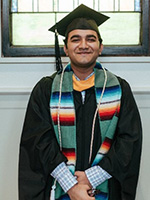 Following completion of his undergraduate degree in 2019 in Mechanical Engineering
from the University of Engineering and Technology in Lahore, Pakistan, Atif chose
to continue his studies at ESF due to his interest in sustainable energy systems and
renewable energy.
Following completion of his undergraduate degree in 2019 in Mechanical Engineering
from the University of Engineering and Technology in Lahore, Pakistan, Atif chose
to continue his studies at ESF due to his interest in sustainable energy systems and
renewable energy.
While completing his degree, Atif’s focus was on distributed solar photovoltaic systems, life cycle assessment and their role in meeting New York State climate goals. Below are links to learn more about this research.
“I am currently pursuing a PhD degree in Circular Economy and Sustainability at Virginia Tech. The Sustainable Energy master’s program at ESF provided me with skills, tools, and knowledge to prepare me for Doctoral research. My ESF journey was a life-changing experience and played a key role in my career path.”
2021
Danhan Wang
Danhan recently published an article in Atmospheric Environment from their MS thesis entitled "Long-term variations in Wintertime Arctic frontal positions and their mercury anthropogenic emission impacts." This was the first study to explore how frontal positions impact mercury emissions in the Arctic. Danhan presented her work at the 14th International Conference of Mercury as a Global Pollutant. This work was also presented at the 101st American Meteorological Society Annual Meeting, as well as an invited talk at the PACES Open Science Meeting. While at ESF, Danhan Wang's Major Professor was Dr. Huiting Mao. Danhan is currently working as a weather forecaster at the Taizhou Meteorological Bureau, Zhejiang, China.
Stacy McNulty
Stacy McNulty is a GPES PhD student at ESF as well as the Associate Director of Research at ESF's Adirondack Ecological Center in Newcomb, NY. An ecologist, her work includes assessing trends in plant, animal, wetland and climatological phenomena. She is focused on broadening student and public participation in field studies and has served as President of the Organization of Biological Field Stations (OBFS). Her dissertation topic, Blue Lining: Evaluation of the Adirondack Policy Network as a Model Social-Ecological System, focuses on the complex relationship between public and private land management in the Adirondack Park. Her PhD advisor at ESF is Dr. Valerie Luzadis. She recently co-edited a book on boreal bird ecology and conservation and currently leads a multiyear study of recreation on public lands in the Adirondack Forest Preserve. By integrating forest ecology, landscape ecology, and social-ecological systems, she is taking a holistic approach to examining the management of a critical northeastern temperate ecosystem.
Harold Jones
Harold Jones is a current GPES MS Student in the Ecosystems: Land, Water and Air (ELWA) Study Area working on an NSF funded project examining the balance between ecological and human demands on water resources. He presented his ongoing research entitled "Effects of Beaver Dam Analogs on Late-summer In-stream Water Level Variability" at the American Geophysical Union (AGU) fall 2021 meeting in New Orleans, which examines the use of small dams to alter the dynamics of riparian ecosystems using a Nature Conservancy site at Red Canyon Ranch in Wyoming. His Major Professor is Dr. Stephen Shaw. He is also a Pathway Intern with the U.S. Forest Service, an innovative program designed to provide students with opportunities to explore Federal careers while they're still in school. His current internship is focusing on abandoned mine drainage, a common water pollution problem.
Dustin Hill
Industrial air pollutants can have an adverse impact on human health, especially for those located in proximity to emission sources. 2021 GPES PhD graduate Dustin Hill recently led a group of researchers publishing an article in Environmental Research entitled "Linking metal (Pb, Hg, Cd) industrial air pollution risk to blood metal levels and cardiovascular functioning and structure among children in Syracuse, NY." This work found that blood levels of mercury (Hg) and cadmium (Cd) were elevated in inhabitants near air pollution sources in Syracuse, NY, with a particularly strong impact on children. They also found that regulatory monitoring data are effective measures of spatial lifecourse exposure to air pollutants. This work was one of 8 papers (!) Dustin co-authored during his PhD at SUNY ESF, with a general focus on environmental policy, political economy, and environmental sociology. His Major Professor at ESF was Dr. Mary Collins. Dustin is now in a post-doctoral position at Syracuse University.
Joanna Isadora Lumbsden-Pinto
Joanna Lumbsden-Pinto is a GPES doctoral student focusing on ecological restoration, monitoring, and environmental education. For her PhD, she investigates how pine barrens ecosystems respond to changes in climate and fire regime. Joanna collaborates closely with colleagues at the Brookhaven National Laboratory and the Central Pine Barrens Commission on Long Island, where she led undergraduate research teams from across the United States funded by the U.S. Department of Energy. Her dissertation work provided key contributions to a recent paper on quantifying canopy structures in pine barrens "Characterizing canopy openness in open forests: Spherical densiometer and canopy photography are equivalent but less sensitive than direct measurements of solar radiation". In another collaborative effort, Joanna was a member of a student-faculty team from ESF and Syracuse University and co-authored a review paper on the effects of biotic interactions on plant mortality under increasing drought stress "Friend or foe? The role of biotic agents in drought-induced plant mortality". Joanna has received awards from the Sussman Foundation, New York Flora Association, Ecological Society of America, Society of American Foresters, and ESF Alumni Association. Joanna's Major Professor at ESF is Dr. Martin Dovciak.
Andres Urcuqui
Andres Urcuqui finished his PhD in GPES Human Dimensions of the Environment in May 2021, also completing certificates in Environmental Leadership at ESF and Advanced Study in Conflict and Collaboration at the Maxwell School and University Teaching at the Graduate School at Syracuse University. His dissertation research on Payment for Hydrological Services program in Veracruz, Mexico was supported by a grant from NSF Coupled Natural and Human Systems program. The first publication from his dissertation, "Uncovering Stakeholder Participation in Payment for Hydrological Services (PHS) Decision Making in Mexico and Colombia", appeared in a special issue of Sustainability on Local to Global Scale Environmental Issues. He is a postdoctoral researcher at the University of Maine, working on a USDA funded project, "Developing Adaptive Forest Management Practices to Mitigate Impacts of Climate Change on Human Health," to understand interactions between ticks, tick borne disease, forest management and human behavior using citizen science data. Andres' Major Professor at ESF was Dr. Theresa Selfa.
Melissa Rohde
GPES PhD student Melissa Rohde recently published an article entitled "Groundwater dependence of riparian woodlands and the disrupting effect of anthropogenically altered streamflow" in the Proceedings of the National Academy of Sciences of the United States of America, a high-impact journal. This study focused on the sustainability of streamside forests in the context of groundwater decline in California and the state's Sustainable Groundwater Management Act. In California, riparian (near stream) vegetation exhibits seasonal canopy stress responses to deeper groundwater, and this study indicated greater groundwater coupling along streams with natural flow regimes compared with human-altered streams. Water subsidies in altered stream systems reduce groundwater dependence of riparian woodlands, undermine their adaptations and resilience to natural hydrologic variation, and ultimately threaten their sustainability under dual threats of increased water demand and a changing climate. This article and the larger research project have been featured in Inside Climate News, a leading news site for decision makers and the public that reports on climate change, energy, and the environment. In addition, Melissa's work on sustainable groundwater has been featured in High Country News, an influential magazine about environmental issues in the western US. Other outlets that have featured the paper are Tree Hugger, a sustainability news site and The Nature Conservancy's Groundwater Resource Hub. Melissa's Major Professor at ESF is Dr. John Stella.
Jordan Jessamy
GPES MS student Jordan Jessamy was recently awarded a prestigious NSF Graduate Research Fellowship Program (GRFP) grant to support his graduate research project, "Feedbacks Between Socioeconomic Status and Urban Forest Structure and Function". The project involves the intersection of urban forestry and environmental justice, and links the structure, composition, and function of urban trees in Syracuse, NY to the vast disparity in opportunity and wealth among neighborhoods. Jordan is working with the City of Syracuse and the US Forest Service to develop recommendations for greening the city in a way that is more equitable in its distribution of ecosystem services. The NSF GRFP recognizes and supports outstanding graduate students in NSF-supported STEM disciplines who are pursuing research-based master's and doctoral degrees at accredited US institutions. This award is a testament to the Jordan's hard work and dedication and is another example of a GPES student success story. His Major Professor at ESF is Dr. John Stella.
Laura Gallup
Mangroves are critical components of coastal ecosystems, providing multiple services and benefits. Building on her work as a Mangrove Project Specialist for the Peace Corps in Senegal, GPES MS graduate Laura Gallup recently published an article in Ocean & Coastal Management entitled "Mangrove use and management within the Sine-Saloum Delta, Senegal". This work indicated that dead mangrove wood for fuelwood is the most important extractive use of mangroves in the Delta, followed by fish, clam, oyster, and shrimp collection. Despite these benefits, ambiguity remains about mangrove management and protection in the region; financial incentives from international organizations and NGOs provide motivation for increased community involvement. Laura is currently an Associate with Tetra Tech International Development and is another example of the excellence of past and current GPES students. Her Major Professor at ESF was Dr. David Sonnenfeld.
Michael Petroni
A group led by GPES PhD student Michael Petroni developed a new tool to identify communities in New York State with potential environmental justice issues. The tool provides stakeholders with a convenient way to visualize environmental disparities by using a decision tree to classify communities based on a cumulative risk assessment model which includes pollution, climate, health, and sociodemographic risk factors. This work is strongly connected to New York's Climate Leadership and Community Protection Act. The act, signed into law last year, requires specific benefits and protections to communities identified based on geographic, public health, environmental hazard, and socioeconomic criteria. This work has recently been published in Environmental Science & Policy, and provides a framework for identifying disadvantaged environmental justice communities and communicating results for public protections and equity investments. Michael's Major Professor at ESF was Dr. Mary Collins.
Charity Nyelele
Dr. Charity Nyelele, a post-doctoral researcher at the University of California Irvine who graduated from GPES in 2021, recently published an article from her PhD thesis research in Landscape and Urban Planning entitled "A multi-objective decision support framework to prioritize tree planting locations in urban areas". This research developed a new methodology for incorporating commensurate and non commensurate objectives within an urban forest planning and management decision support system. In a case study in the Bronx, NY, the analysis utilized spatially distributed census block group data and linear programming, a mathematical optimization technique, to identify optimal and equitable planting locations considering increases in tree cover, monetary benefits from avoided runoff, PM2.5 air pollutant removal and heat index reduction as well as tree planting costs and the equality and equity of urban tree ecosystem services. The multi-objective prioritization framework can identify optimal locations for greater total benefits from urban greening and has the potential to better inform urban forest decision making urban areas. Charity's Major Professor at ESF was Dr. Chuck Kroll.
Ari Engelberg
GPES MS graduate Ari Engelberg has seen his way around the field of environmental restoration. Prior to coming to SUNY ESF, he worked for the Chesapeake Bay Trust where he coordinated riparian plantings and invasive removals. At SUNY ESF, his MS thesis focused on land cover and climatic drivers of nutrient loading and runoff in Catskills/Delaware watersheds. After graduating from ESF, he took a position as an Oak Ridge Institute of Science and Education (ORISE) Research Fellow with the US Environmental Protection Agency (EPA) where his work included documenting watershed restoration projects across the US. He currently is an Implementation Project Officer for the Maryland Department of Natural Resources where he manages watershed restoration projects and leads interagency research efforts including the Pooled Monitoring Initiative's Restoration Research Program. This work supports monitoring and restoration efforts such as aquatic sampling, vegetation sampling, stream restorations, and tree plantings. He has also served as a Focus Group Co-Lead for the 2020-2030 Maryland Climate Adaptation and Resilience Framework. Ari is yet another example of a highly successful GPES graduate!
2020
Austin Arrington
With an undergraduate degree in English from Penn State University, Austin Arrington wanted to make a positive impact in the world. He found his passion in the intersection between humans and their environment, and while pursuing a graduate degree in Bioethics at NYU, he started working with the installation of green roofs in New York City. He came to SUNY ESF to broaden his understanding of Environmental Science while focusing on Ecosystem Restoration. Austin finished his GPES MS degree in 2016 with a thesis entitled "Where the fruit falls: Utilizing a web and mobile community monitoring application to study geo-demographic and landscape level urban foraging trends across the United States", and findings from his thesis were published in the Oxford Journal of Urban Ecology. Since graduating from SUNY ESF, Austin co-founded PLANT GROUP, a design-build firm specializing in green roofs and green infrastructure in New York City. He currently works as a Data Scientist at Teralytic, an agricultural sensor company focusing on soil health, and is one of the many GPES student success stories.
Mariah Gladstone
Mariah Gladstone grew up in Northwest Montana. After graduating from Columbia University with a degree in Environmental Engineering, she returned home where she developed Indigikitchen, an online cooking show dedicated to re-indigenizing our diets using digital media. She is passionate about sustainability and completed a service term through Energy Corps where she helped write a Climate Action Plan for Whitefish, MT. She has been recognized as a "Champion for Change" through the Center for Native American Youth, a "Culture of Health Leader" through the Robert Wood Johnson Foundation, a Grist 50 "Fixer", and is currently on the board of the Native Youth Food Sovereignty Alliance (NYFSA). She also has a TEDx Talk where she discusses the importance of an Indigenous diet. At SUNY ESF, Mariah is a Sloan Foundation Indigenous Graduate Fellow and is pursuing an M.S. degree in Environmental Science with a concentration in Coupled Natural and Human Systems with a focus on indigenous knowledge. Mariah was recently named one of eight 2020 MIT Solve Indigenous Communities Fellows, a program that encourages the use of tech-based approaches to solve global challenges. Mariah is another excellent example of a GPES student success story!
Shumaila Bhatti
Second year GPES PhD student Shumaila Javed Bhatti's photograph was selected as one of the top 75 photographs for exhibition (out of over 50,000 entrants) from #TheWorldWeWant, a global photo contest in support of the 75th anniversary of the United Nations. The photo, taken in the summer of 2019 in the Alaskan Fjords, shows a moment when a glacier breaks during the warm summer melt. The International Panel on Climate Change (IPCC) has documented unprecedented reduction in the extent and mass of glaciers around the world, especially in high mountain areas where downstream communities are reliant on glacier melt as a significant source of fresh water. This water sustains the ecosystem and supports the livelihood of downstream inhabitants, and changes to the mountain cryosphere will cause insurmountable disruptions to this delicate balance. Ms. Bhatti's photo captures this critical process and serves as a reminder of the havoc of climate change around the globe. Ms. Bhatti is focusing on Environmental Communication and Participating Processes for her PhD studies. We salute and celebrate her accomplishments!
Charity Nyelele
A new study by August 2020 GPES PhD graduate Charity Nyelele shows demographically and economically disadvantaged census blocks of the Bronx have less urban forest and the critical ecosystem services they provide. This analysis explores the equality and equity of urban ecosystem services and provides a framework to explore how to design urban landscapes to be more just and equitable. This study found that disadvantaged socio-demographic and socio-economic census block groups in the Bronx tended to have lower tree cover and, as a result, received fewer ecosystem services and benefits. Dr. Nyelele's research committee at ESF was comprised of engineers, social scientists, and foresters, and is a great example of how ESF pursues interdisciplinary research. This research is also a feature article in Envirobytes. Dr. Nyelele recently began a prestigious post-doctoral position at the University of California Irvine working on a collaborative research project that will develop and communicate strategies to better manage California's natural lands for climate change. Her research focus will be on the economic valuation and mapping of ecosystem service beneficiaries.
Michael Petroni
GPES PhD student Michael Petroni is the lead author on a September 2020 publication examining the links between chronic exposure to hazardous air pollutants (HAPS), such as formaldehyde and chromium, and COVID-19 mortality rates. HAPS are regulated by the Clean Air Act and known or suspected to cause cancer and other serious health problems. Analyzing county-level data, results from the study indicate that on average U.S. counties with the highest HAPS levels are experiencing double the COVID-19 mortality rate compared to counties with the lowest HAPS levels. Interestingly, counties with high mortality were not just highly populated urban areas, but also semi-rural southern states. The study identified relationships between specific HABS concentrations and expected additional COVID-19 death rates. Ongoing work is hoping to probe deeper into the links between HAPS and COVID-19 mortality. The study involved SUNY ESF faculty, graduate and undergraduate students, and is another example of the great work GPES graduate students are doing to improve our world.
Sara Velardi
GPES graduate Dr. Sara Velardi recently published a paper entitled "Framing local: an analysis of framing strategies for genetically modified organism (GMO) labeling initiatives in the northeastern U.S" in the journal Agroecology and Sustainable Food Systems. This study analyzed state food labeling initiatives in CT, MA, ME and VT with a particular focus on genetically modified organisms (GMOs). This study found that labeling tied to individual consumer rights and economic risks were evident across all states' discourses on GMO labeling, with some states emphasizing concerns linked to public health and a lack of scientific data to support labeling initiatives. GMOs continue to be a hotly debated issue amongst environmentalists, the food industry, and the general public. Dr. Velardi is currently a Lecturer in the Department of Environmental Studies at Binghamton University.


